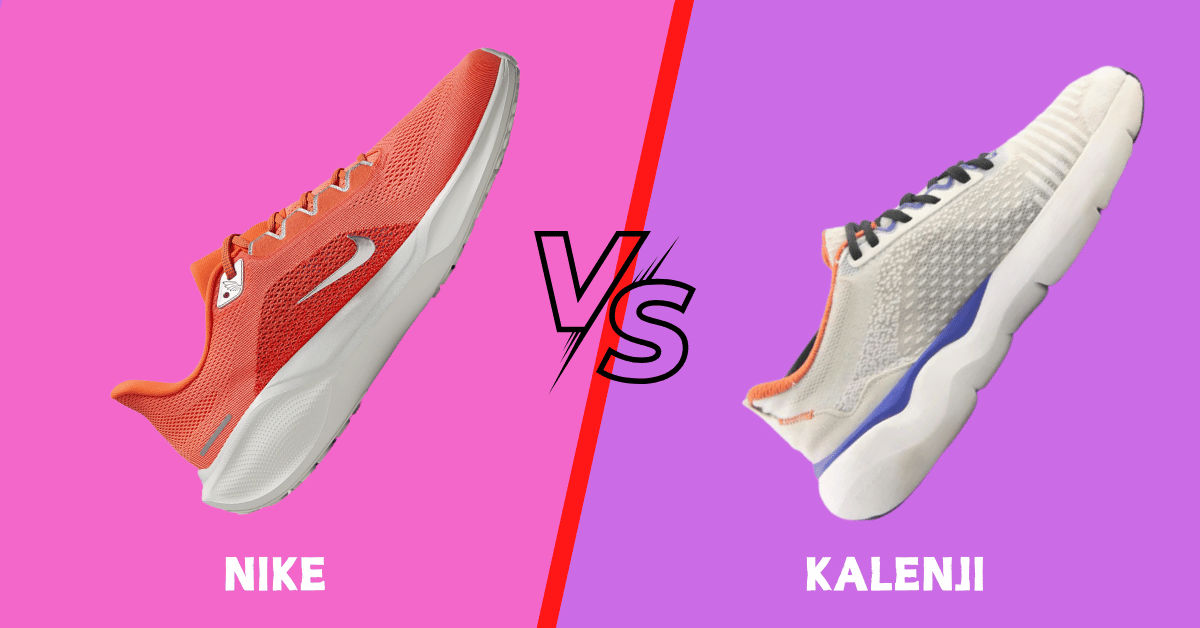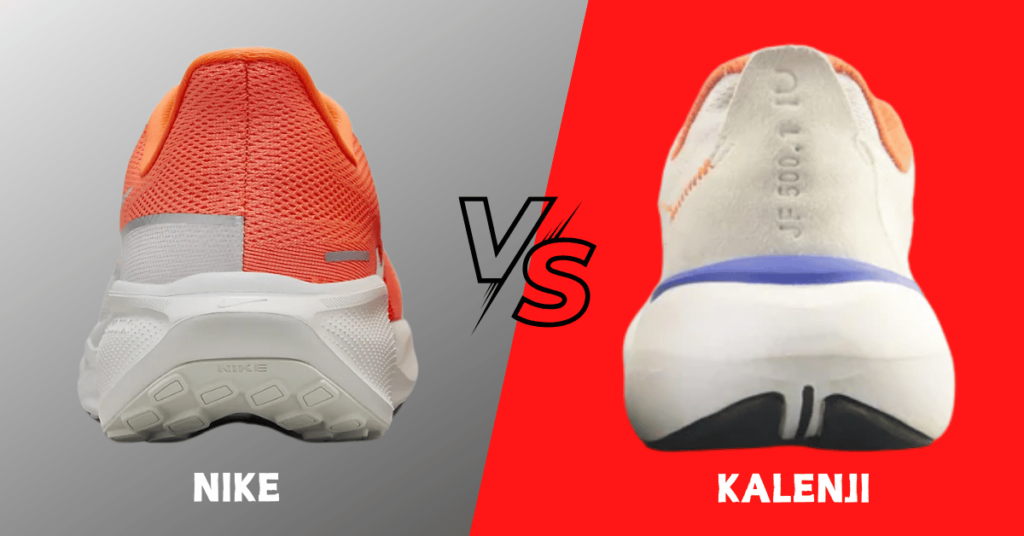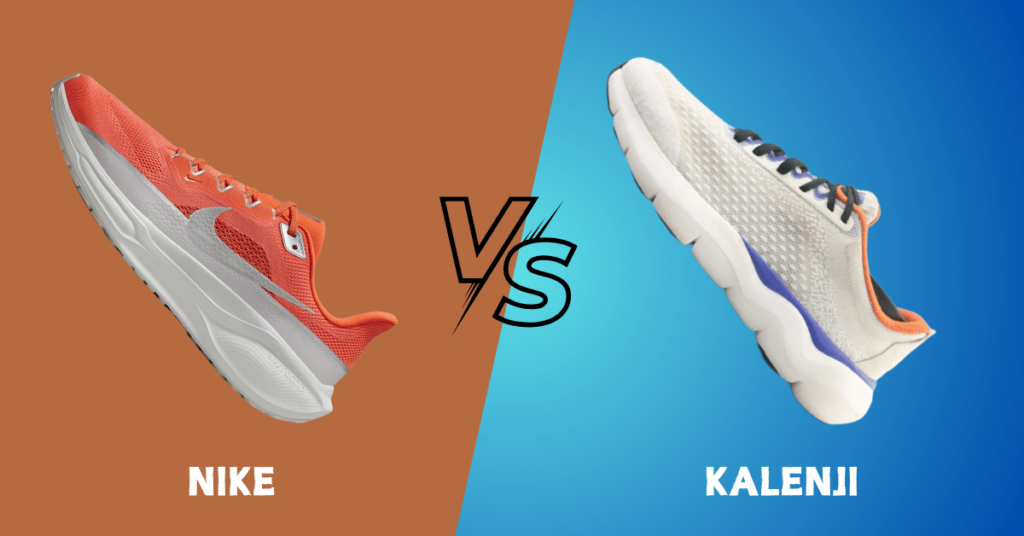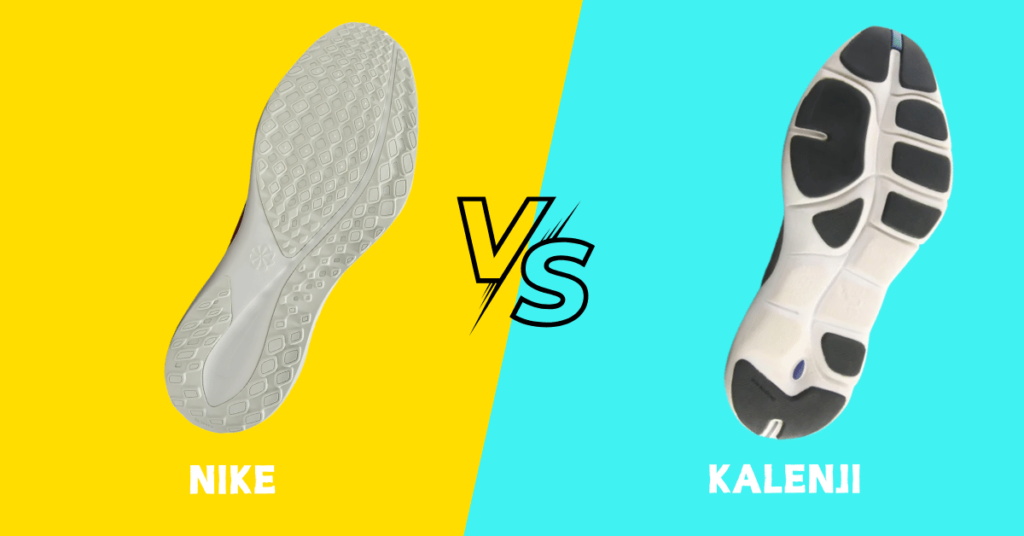Physical Address
304 North Cardinal St.
Dorchester Center, MA 02124
Physical Address
304 North Cardinal St.
Dorchester Center, MA 02124

Regarding sportswear and running shoes, two names often come up in conversations—Nike vs Kalenji. Both brands Nike vs Kalenji offer unique qualities that cater to various needs. This article provides a detailed comparison across several critical aspects to help you make an informed decision.

| Feature | Nike | Kalenji |
| Comfort | High-tech cushioning (Zoom Air) | Basic cushioning (EVA foam) |
| Style and Design | Trendy and fashionable | Practical and functional |
| Durability | Long-lasting materials | Decent for light usage |
| Breathability | Advanced (Flyknit, mesh uppers) | Standard mesh uppers |
| Fit and Support | Snug, adaptive fit | Roomier, standard support |
| Sizing Consistency | Slightly narrow fit | True to size, fits wider feet |
| Pricing | Premium ($80–$200+) | Affordable ($20–$60) |
| Customer Reviews | High-quality but pricey | Affordable but basic performance |
When comparing Nike vs Kalenji, comfort plays a pivotal role, with Nike offering advanced cushioning technologies for superior support, while Kalenji focuses on affordability and basic comfort for casual runners.
Nike is known for incorporating advanced cushioning technologies such as Zoom Air and React Foam. These features provide exceptional comfort for long runs, gym workouts, and everyday wear.
Kalenji, a Decathlon-owned brand, focuses on affordable comfort. Shoes like the Run Cushion have simple yet effective foam midsoles, offering decent shock absorption for light jogging or walking.
| Feature | Nike | Kalenji |
|---|---|---|
| Cushioning | High-tech (Zoom Air) | Basic (EVA Foam) |
| Intended Use | Long-distance & sports | Casual running & walks |
When comparing Nike vs Kalenji, Nike excels with trendy, innovative designs that appeal to fashion-conscious athletes, while Kalenji offers functional and straightforward styles for practical use.
Nike is a trendsetter in the sportswear industry. Its sleek, innovative designs make a fashion statement. From vibrant colorways to minimalistic looks, Nike appeals to a broad audience, including athletes and casual wearers.
Kalenji shoes are practical and straightforward. While their designs prioritize functionality over fashion, they may not appeal to those looking for a stylish edge.

The key differences between Nike vs Kalenji lie in their target audience, pricing, and technology, with Nike focusing on premium innovation and performance, while Kalenji caters to budget-conscious users with practical designs.
| Aspect | Nike | Kalenji |
|---|---|---|
| Target Audience | Professional athletes | Budget-conscious consumers |
| Innovation | Cutting-edge technology | Practical, no-frills design |
| Price Range | Premium | Affordable |
In the Nike vs Kalenji comparison, Nike shoes often run narrow and may require sizing up, while Kalenji offers true-to-size options with a roomier fit for broader feet.
Nike shoes tend to run slightly narrow, which might require sizing up for some users. The sizing is consistent across models but less accommodating for wide feet.
Kalenji shoes are true to size and generally offer a roomier fit, making them a good choice for broader feet.
When it comes to brand reputation, Nike vs Kalenji shows a clear contrast, with Nike being a global leader known for innovation and performance, while Kalenji is gaining recognition for its affordability and value-focused offerings.
With decades of experience, Nike is synonymous with innovation and quality. Backed by endorsements from top athletes, the brand has a global fanbase.
Kalenji is gaining traction among budget shoppers and amateur runners. While it doesn’t have the same global reach, it is recognized for its value-for-money offerings.
In the Nike vs Kalenji comparison, Nike offers advanced breathability with technologies like Flyknit and mesh uppers, while Kalenji provides standard mesh designs that offer decent airflow for casual runners.
Nike uses materials like Flyknit and mesh uppers to enhance airflow, ensuring breathability during intense workouts.
Kalenji shoes feature mesh uppers, but their breathability is slightly less advanced than Nike’s premium models.

When comparing Nike vs Kalenji, Nike stands out for its long-lasting materials and robust construction, while Kalenji offers decent durability for light use but may not withstand the heavy wear that Nike shoes can handle.
Nike shoes are built to last. They often feature durable rubber outsoles and high-quality materials, making them suitable for extensive use.
Kalenji provides decent durability, but its shoes’ lifespan is shorter than Nike’s, especially under heavy usage.
In the Nike vs Kalenji comparison, Nike provides a snug, adaptive fit with advanced support technologies, while Kalenji offers a roomier fit and standard support suitable for casual runners.
With technologies like Dynamic Fit and Flywire cables, Nike shoes provide a snug, adaptive fit. They are ideal for sports requiring lateral movements.
Kalenji shoes offer a standard fit and moderate arch support, sufficient for basic running and walking.
When comparing Nike vs Kalenji, Nike is positioned as a premium brand with higher price points, while Kalenji offers budget-friendly options that provide value without compromising basic performance.
Nike products are premium-priced, reflecting their advanced features and brand reputation. Shoes range from $80 to over $200.
Kalenji is a budget-friendly alternative, with most shoes priced between $20 and $60.
| Price Range | Nike | Kalenji |
|---|---|---|
| Budget-Friendly | No | Yes |
| High-End Options | Yes | No |
In the Nike vs Kalenji comparison, Nike receives praise for its high-quality, performance-driven products, although often noted for their higher cost, while Kalenji is appreciated for its affordability and comfort, though some users find it lacks advanced features.
Nike users appreciate the brand’s quality and performance but often point out the high cost. Some find the fit too narrow.
Kalenji users love the affordability and decent comfort. However, advanced runners might find them lacking in performance features.

Nike vs Kalenji caters to different audiences. If you prioritize cutting-edge technology, long-term durability, and trendy designs, Nike is the better choice. On the other hand, if you are looking for budget-friendly options for light jogging or casual wear, Kalenji is a great option.
Kalenji is more budget-friendly and suitable for beginners who don’t need advanced features.
Yes, if you value performance, durability, and style.
Kalenji shoes are durable for casual use but may not withstand heavy or long-term use like Nike shoes.
Nike provides better arch support with its advanced technologies.
Kalenji shoes are designed for casual and beginner-level activities rather than professional sports.